
。。。大渡申
这篇由 Asaka Park 撰写的文章,17 岁,是我们第六届年度学生社论大赛的前 12 名获奖者之一,我们收到了 10,509 份参赛作品。
I’m a Disabled Teenager, and Social Media Is My Lifeline
I’m keenly attuned to the unwritten rules of social interaction. I can identify the subtle variations in people’s facial expressions, and I’m quick to read between the lines. And my discernment is not just on an intellectual level, but also at an intuitive level: I’m intimately familiar with the dance of social interaction.
The information that I just provided sounds like a mundanity, until I tell you I was diagnosed with autism. I defy the stereotypes of someone who can’t possibly “get it” socially.
No one knows that I can. I can “get it.”
Of course, people don’t see that. I struggle with impulsivity. My physical clumsiness makes it hard for me to maintain appropriate facial expressions and tone of voice. While I easily grasp abstract concepts, I often can’t convert them into tangible, step-by-step actions, making it difficult to communicate gracefully. Even the untrained eye notice these challenges, and they confound my social faux pas as a failure to understand or share other people’s expectations.
I’m depleted. Every day at school, I isolate myself from most of my peers: it’s a matter of time before they make these assumptions, before they postulate how my brain works. On social media, though, I’m a completely different person. I’m dynamic. I’m assertive. I’m people-oriented.
Many claim that social media distracts teens from meaningful, genuine interactions. My experiences, however, are the total opposite of that. Cultivating my own space on the Internet helped me thrive outside the pigeonhole. Namely, I use my blog to explain the real reason why I act the way I do. Even though not everyone will understand, I know some people will, and it gives me tremendous hope.
I know I’m not the only one. For many disabled people, social media gives them access to a social life and community involvement in an otherwise inaccessible world¹. Not only does social media give me the platform to correct assumptions, people don’t assume things about me in the first place, because it’s a level playing field. For example, when I Tweet, my addled movements are replaced by various emojis and reaction GIFs, which gives me a vaster palette to express myself.
Furthermore, I’ve learned to extend the conversation on disability from my own personal circumstances to the broader issue of ableism. Don Tapscott, a media consultant, remarked, “[Teens] didn’t grow up being the passive recipients of somebody else’s broadcast.”² This definitely resonated with me. I used to feel alone, not seeing girls like me on the magazine covers, but not anymore. In a click, I can create my own media where people with disabilities are seen and heard, rather than pliantly consuming the media that routinely devalue people with disabilities.
Works Cited
Ryan, Frances. “The Missing Link: Why Disabled People Can’t Afford to #DeleteFacebook.” The Guardian, Guardian News and Media, 4 April 2018.
Parker-Pope, Tara. “Are Today’s Teenagers Smarter and Better Than We Think?” The New York Times, The New York Times, 30 March 2018.